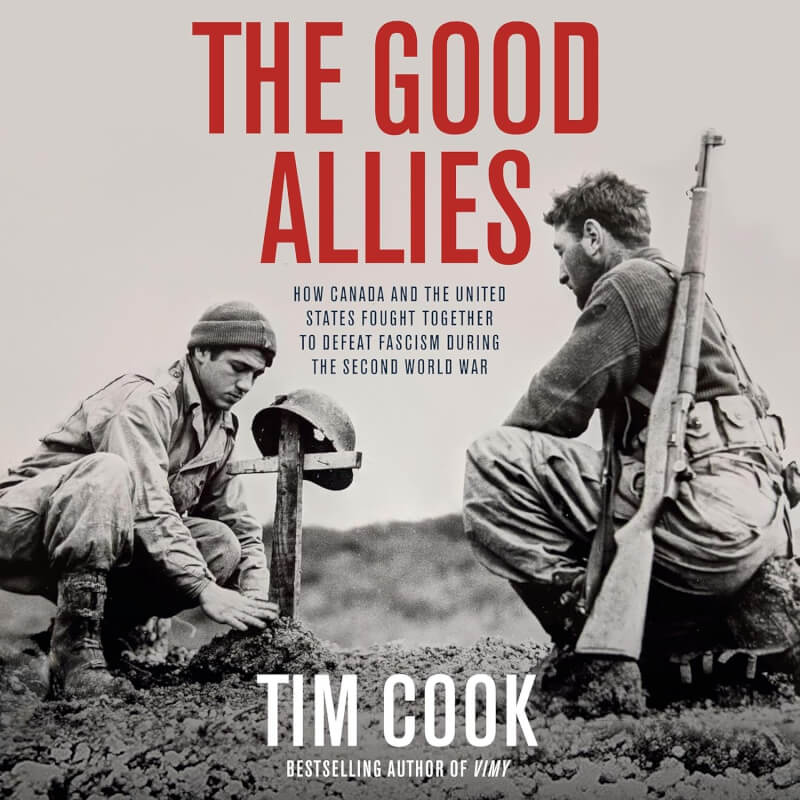
American Secretary of State Marco Rubio met with Canadian Foreign Affairs Minister Mélanie Joly to discuss the two country’s shared goals. [U.S. State Department]
During the discussions, Joly gifted Rubio a copy of The Good Allies, a new book by Canadian military historian Tim Cook about the relationship between the two North American countries during the Second World War. In a note accompanying the gesture, she penned: “Marco, an example of what we can achieve when we work together.”
Cook, the chief historian at the Canadian War Museum and now the author of some 19 military history books, spoke to Legion Magazine about why now, more than ever, Canada and America’s historical dynamic is important to understand.

The latest book by Canadian historian Tim Cook examines how the two North American countries worked together to fight fascism. [©2024 Tim Cook (P)2024 Allen Lane]
Many of our [Second World War] histories have often focused on the transatlantic connection [between Canada and the U.K.] because, for the most part, our armed forces fought with the British armed forces. But when I turned my gaze north-south over the 49th parallel, I realized it was a different view worth exploring.
This story is about the defence of North America. It’s about wartime industry. It’s about the interconnected and entangled wartime economies. Rarely is that ever covered in other books or is skated over quickly, so I wanted to change that.
Frankly, I also wanted to write the book to tell American friends about Canada’s contribution because I have often spoken to colleagues, to smart people with a decent understanding of the Second World War, who have only the barest of knowledge of what Canada did at that time. It’s often reduced to Dieppe or sometimes D-Day, but they know next to nothing about our other efforts.
On the Canada-U.S. relationship before the war
It wasn’t strong. We were bad neighbours through the 18th and 19th centuries, a period of wars and conflicts, of raids and threats and anxiety and more. By the early 20th century, we had started to come together. The Americans, for the most part, had avoided their worst instincts to conquer Canada. But it remained an uneasy relationship as we were still then proudly part of the British Empire.
Equally, however, there was an issue of heart and head. Canada’s heart remained with Britain. But our head told us that we had to be part of this North American economy, and it’s the Second World War that really supercharges that evolution.
On wartime cross-border co-operation
Wartime Canada had a number of strategic goals. The key was to keep Britain in the war, to be a good ally, but that was achievable only by leaning into the U.S.
Wartime production is particularly fascinating because there’s a huge gap in the historiography regarding that critical industry. For example, Canada produced hundreds of millions of shells and around 16,000 aircraft. It’s worth noting that more Canadians ended up working in wartime industry than served in uniform.
The defence of the North American west coast is a prime example of how Canada was able to stand with the U.S. as a good ally, especially after Pearl Harbor. I think the four RCAF squadrons in Alaska are an important and unknown contribution. I think about us sending anti-aircraft batteries to other areas when they were most needed. I think of the Royal Canadian Navy warships that operated off the west coast when they could have been used in the Battle of the Atlantic. We did this because we had to stand with the Americans. And that’s exactly what we did.
On joint-U.S.-Canadian combat service
The First Special Service Force, nicknamed “The Devil’s Brigade,” is one of those great examples, one of the better-known examples, where we served and sacrificed together. It’s a really great story, and one that I was pleased to situate in my book as almost an embodiment of the close relationship between the North Americans.
The [Operation] Torch landings [in North Africa] in November 1942 is likewise an interesting example, where Canada sent 17 corvettes to assist. That’s a significant contribution in which we take the hit for our allies. We needed those corvettes in the Battle of the Atlantic, but we sent them there to again assist the Americans.
I think of Sicily, an often-forgotten part of the war. I think of mainland Italy, where the joint-U.S.-Canadian Devil’s Brigade earned its reputation. And, of course, there’s D-Day, that most significant example of us standing beside our allies.
On lessons from wartime bonds
I try to write histories that are firmly in the past. I’m a historian—that’s where I write. I’m not a political scientist, and I’m not writing political science here.
Despite this, I also think it’s important for our history to tell us something about the contemporary period. It’s clear that the alliance maintained between the U.S., Canada and Britain—alongside other nations—was critical in defeating the Axis powers some 80 years ago. Alliances amplify power; they’re not just there as a hindrance, and I think that’s a lesson that seems to be resonating with people.
Of course, I’m proud that our minister of foreign affairs gifted my book [to U.S. Secretary of State Marco Rubio], although I suspect it’s less about saying what happened in 1939-45 and more about how these bonds continue to be relevant.
Advertisement






















